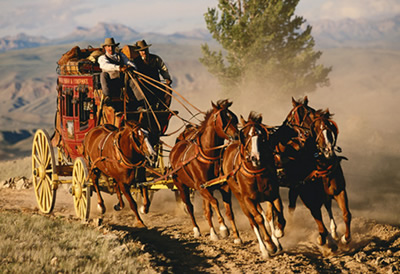America’s
First Freight Haulers
By SharLeigh

The discovery
of gold in California started a great migration westward! The vast
migration led to some problems - everyone was going west but commerce
had to travel both east and west to thrive and keep up with supply
and demand. The Congress of the United States issued a $600,000 contract
for a twice a week westerly mail route and only gave the parties one
year to begin regular service. John Butterfield, William B. Dinsmore
and William G. Fargo were awarded the contract and immediately sent
out exploration parties to survey the territory and lay out the route.
This project alone took eight months, covering 2,757 miles of trail.
Also, it included the building of 100 stagecoaches, purchasing 1,500
horses and mules, building station houses, corrals and hiring men
to man the stations, cook the food and take care of the stock. The
run was between St. Louis/Memphis and San Francisco.
Each run had to be made in 25 days no matter the weather, hostile
attacks or robbers. The overland stage route had stations from 18
to 113 miles apart. The stage would stop at a station just long enough
to hitch up a new team and then take off again. Twice a day the stage
stopped for the passengers to get coffee, beef jerky and biscuits.
The stage would average from 5 to 12 miles per hour with no rest for
the passengers. Night and day you traveled, until you reached your
destination.
The 25-day run, which went over craggy peaks, mountain passes and
through miles of hot, dry, dusty desert, was not “First Class” nor
was it for the weak of heart, but it got mail, supplies and passengers
through! Next month some interesting stories of stage etiquette, the
PO8 bandit and a very interesting stagecoach driver.
|
